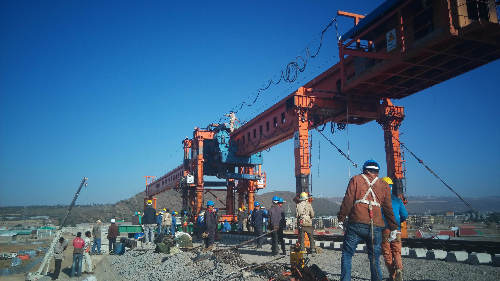A decade of building and living in Africa
 0 Comment(s)
0 Comment(s) Print
Print E-mail China Today, September 8, 2015
E-mail China Today, September 8, 2015
The tracks that connect Ethiopia's capital Addis Ababa and its southern city Mieso embody the country's first modern railway. Stretching 329 km and designed for trains traveling at 120 km/h, the railway was built by the China Railway No.2 Group Co., Ltd. During a ceremony to mark the project's completion, Ethiopian Prime Minister Hailemariam Desalegn said that it would become the lifeblood of the country's economy.
Before that on February 1, the company held a ceremony marking the trial operation of the Addis Ababa light rail project. This is the first urban light rail in Ethiopia, as well as Africa's first light rail project contracted to a Chinese enterprise. Liu Jilong, one of the project managers, has been working in Africa for a decade and has witnessed railways take shape on the continent.
|
|
|
The construction site of Ethiopia's railway project. |
Get to know the land
After graduating from the Central South University in Hunan Province, Liu became an English translator at the Transtech Engineering Corporation in 2004. The company, based in Sichuan Province's capital Chengdu, is engaged in international engineering and construction projects, import-export activities and international investment. Today, scores of companies like this can be found in China.
At that time, the company had business in about 10 countries scattered in Africa, Southeast Asia, the Middle East and South America. Less than a year after joining Transtech, Liu was sent to Angola, where the company had a railway project in the capital city Luanda.
Liu flew to Africa with some knowledge of the local life, gleaned from colleagues and media reports. But nothing prepared him for the shock of seeing what would become his new home.
"The streets and roads were full of bumps and potholes," Liu said. "Drainage facilities did not work well and in some places were even absent." To him the buildings in the capital resembled those found in small Chinese towns.
The Luanda railway project was signed in 2003. The year before that, Angola's civil war, which had lasted for nearly three decades, finally ended. "The government decided to invest in more infrastructures to revive the economy, but the plan was beset with financial problems," Liu said. "The assistance provided by Western countries and the financial organizations dominated by those countries came with harsh conditions. The Chinese government provided financial support upon the request of the Angolan government."
Transtech took on a US $120 million project to rebuild the Luanda railway, together with the China Machinery Engineering Corporation. The work included design, procurement, and construction. At that time, it was the largest project China had ever contracted in Angola. When it started, Liu said, the staff included about 100 Chinese citizens. As his company signed more local contracts, their Chinese employees grew to some 700.
The railway, which connects the Angolan capital and the Port of Luanda to the country's rail network, plays an important role in the domestic freight system. Soon after the project started, China and Angola signed a financing package, in which China offered loans and technology for Angola's infrastructure construction. The package, worth US $600 million in accumulated contract value, included the country's largest housing construction project, railway rehabilitation, municipal engineering, and irrigation and water conservancy. The massive amount of development work brought to Angola more Chinese enterprises.
In August 2013, Luanda's railway administration recognized the Angolan branch of Transtech for its outstanding construction quality and work efficiency. Liu, however, could no longer attend the awards ceremony. He had already been transferred to Uganda.







Go to Forum >>0 Comment(s)